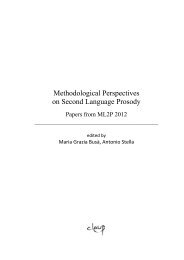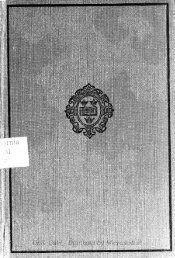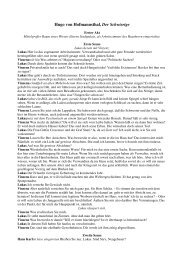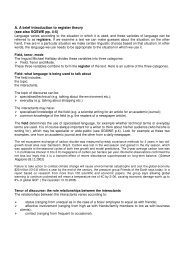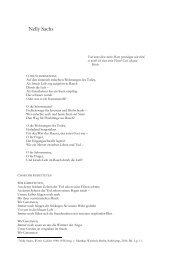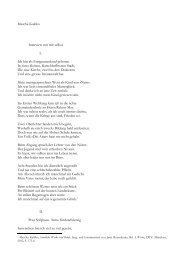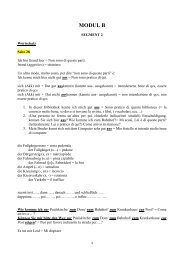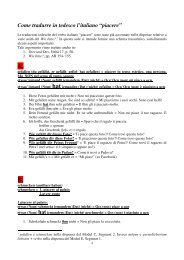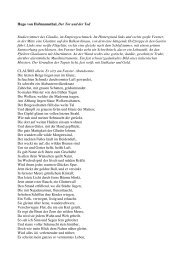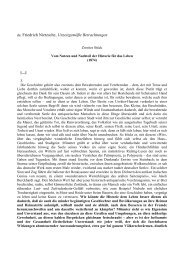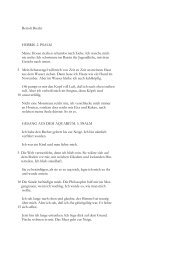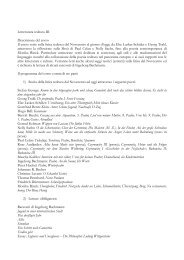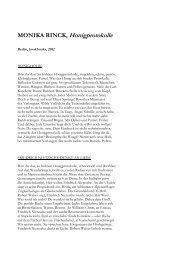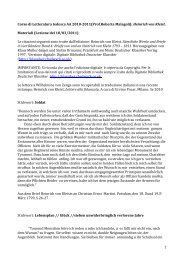1 They Never Wept, the Men of my Race: Antjie Krog's Country of my ...
1 They Never Wept, the Men of my Race: Antjie Krog's Country of my ...
1 They Never Wept, the Men of my Race: Antjie Krog's Country of my ...
You also want an ePaper? Increase the reach of your titles
YUMPU automatically turns print PDFs into web optimized ePapers that Google loves.
8<br />
to write in Afrikaans is not a right but a privilege bought and paid for at a<br />
price – and that it brings with it heavy responsibilities. 27<br />
Of course this essay was written in Afrikaans, and is here translated by <strong>the</strong><br />
daughter in an act <strong>of</strong> treachery against exactly <strong>the</strong> sentiments expressed in her<br />
mo<strong>the</strong>r’s essay. 28 The quotation from <strong>the</strong> mo<strong>the</strong>r is inserted here as part <strong>of</strong> an<br />
argument for <strong>the</strong> necessity <strong>of</strong> betraying <strong>the</strong> language <strong>of</strong> <strong>the</strong> ancestors, Krog’s<br />
use <strong>of</strong> it directly contradicting <strong>the</strong> logic and argument <strong>of</strong> <strong>the</strong> original. And in <strong>the</strong><br />
way that Krog uses it, she concludes that <strong>the</strong> farm will remain barred against reentry<br />
by <strong>the</strong> daughter who has chosen not to use <strong>the</strong> language <strong>of</strong> <strong>the</strong> fa<strong>the</strong>rs;<br />
and who has betrayed <strong>the</strong> legacy <strong>of</strong> <strong>the</strong> ancestors. In this move, Krog suggests<br />
that white South Africans who identify beyond <strong>the</strong> bounds <strong>of</strong> <strong>the</strong>ir racial<br />
classification, struggle to maintain a sense <strong>of</strong> history, having chosen not to<br />
perpetuate <strong>the</strong> ‘route <strong>of</strong> <strong>the</strong> blood’.<br />
One solution that seems to be investigated increasingly frequently by white South<br />
African writers is to claim ano<strong>the</strong>r kind <strong>of</strong> past from that which was celebrated by<br />
<strong>the</strong> white or Afrikaner ancestors. In some writing by white South Africans, <strong>the</strong>re<br />
is a memory <strong>of</strong> a time before <strong>the</strong> white ancestors, a time when <strong>the</strong> white child<br />
was cared for and parented by a good black mo<strong>the</strong>r – and in <strong>my</strong> argument here I<br />
want to make clear that I think this is a highly problematic solution. In Afrikaans<br />
playwright Reza de Wet’s works <strong>the</strong>re is a strong sense <strong>of</strong> what she calls a<br />
healing African spirituality, <strong>of</strong>ten embodied in a black woman. 29 De Wet says in<br />
an interview: ‘The black woman is for me representative <strong>of</strong> unconditional loving<br />
[and she uses this term in English, while <strong>the</strong> rest <strong>of</strong> <strong>the</strong> interview is conducted in<br />
Afrikaans] and a nurturing source. But she also represents for me all that we<br />
have betrayed and repressed, and that which could have had such a positive,<br />
saving influence’. 30 One could write an entire paper on this quote, but I want to<br />
point out only <strong>the</strong> fact <strong>of</strong> <strong>the</strong> totalising singular form, and <strong>the</strong> use <strong>of</strong> ‘we’, a ‘we’ I<br />
shall come back to in <strong>the</strong> concluding remarks <strong>of</strong> this paper.<br />
Ano<strong>the</strong>r example <strong>of</strong> this trend, in which white South African writers talk <strong>of</strong> <strong>the</strong><br />
abandonment <strong>of</strong> <strong>the</strong>ir blood lineage in favour <strong>of</strong> a newly acquired ‘African’ family<br />
can be found in Rian Malan’s My Traitor’s Heart, about which I have written more<br />
completely elsewhere. 31 The narrative is filled with yearning for recognition by<br />
ano<strong>the</strong>r mo<strong>the</strong>r, ano<strong>the</strong>r lineage. Malan quotes Breyten Breytenbach saying that<br />
we (again this unproblematised ‘we’ - white South Africans) must give ourselves<br />
27 Ibid., p. 98<br />
28 The 1970 poem “Ma” ends with <strong>the</strong> words: “ek is so jammer mamma/ dat ek nie is/ wat ek<br />
graag vir jou wil wees nie” (I am so sorry, mum<strong>my</strong>, that I am not that which I so long to be for<br />
you”).<br />
29 R. de Wet, Diepe Grond (Pretoria, HAUM, 1986).<br />
30 R. de Wet. Interviewed by Riaan de Villiers, Die Suid-Afrikaan 10, Autumn 1987.<br />
31 C. Coetzee, ‘Going Native: Rian Malan's Dream <strong>of</strong> a Dark Heart’ (unpublished paper, Cape<br />
Town, 1998).



